英语作文必备副词和介词短语
英语作文中常用连接词和短语
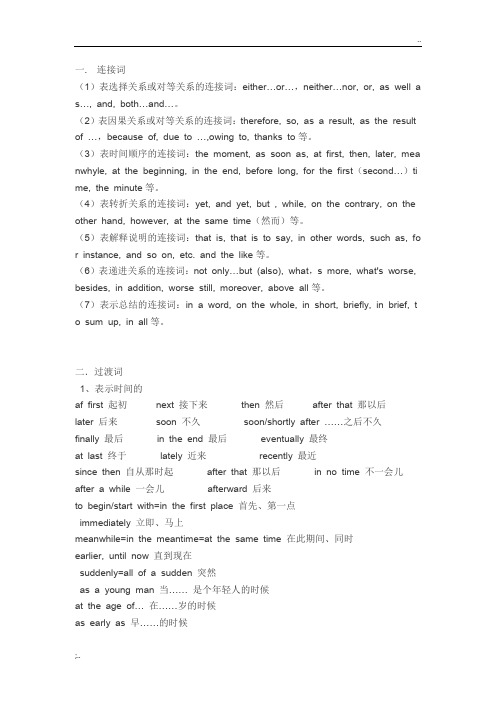
..一. 连接词(1)表选择关系或对等关系的连接词:either…or…,neither…nor, or, as well a s…, and, both…and…。
(2)表因果关系或对等关系的连接词:therefore, so, as a result, as the result of …,because of, due to …,owing to, thanks to等。
(3)表时间顺序的连接词:the moment, as soon as, at first, then, later, mea nwhyle, at the beginning, in the end, before long, for the first(second…)ti me, the minute等。
(4)表转折关系的连接词:yet, and yet, but , while, on the contrary, on the other hand, however, at the same time(然而)等。
(5)表解释说明的连接词:that is, that is to say, in other words, such as, fo r instance, and so on, etc. and the like等。
(6)表递进关系的连接词:not only…but (also), what,s more, what's worse, besides, in addition, worse still, moreover, above all等。
(7)表示总结的连接词:in a word, on the whole, in short, briefly, in brief, t o sum up, in all等。
二.过渡词1、表示时间的af first 起初next 接下来then 然后after that 那以后later 后来soon 不久soon/shortly after ……之后不久finally 最后in the end 最后eventually 最终at last 终于lately 近来recently 最近since then 自从那时起after that 那以后in no time 不一会儿after a while 一会儿afterward 后来to begin/start with=in the first place 首先、第一点immediately 立即、马上meanwhile=in the meantime=at the same time 在此期间、同时earlier, until now 直到现在suddenly=all of a sudden 突然as a young man 当…… 是个年轻人的时候at the age of… 在……岁的时候as early as 早……的时候..as soon as 一……就……before, the other day 几天前early in the morning 大清早after/before dark 天黑后/前one day 有一天one afternoon 一天下午one morning 一天早晨2、表示空间的to the right/left 朝右/左on the rinht/left 在右/左边in the middle of 在中间in front of 在前面in the front of 在前面at the back of 在后面at the bottom of 在底部on the edge of 在……的边上on top of 在……的顶部opposite to 与……相对close to 靠近near to 在……附近next to 与……相邻under 垂直在下over 垂直在上below 在下方above 在上方across 在……的另一边around 在周围behind 在后before 在前against 靠着、抵着further on 再往前3、表示列举和时序first, second, third…finallyfirstly, secondly, thirdly…finallyfirst of all, next then, lastlyfor one thing…for another…at the same timeat first,at last4、表示列举for example 例如:……namely 即……for instance 例如:……that is (to say) 也就是说such as 如……take…for example 拿……来说like 像……5、表示比较或对比like 像unlike 不像similarly 同样地in the same way 以相同的方式compared to 与……相比while 而still=nevertheless 然而on the contrary 正相反different from 与……不同on (the) one hand…on the other hand 一方面……另一方面in contrast with 与……成对比6、表示增补and 而且both…and 不但……而且not only…but also 不但……而且as well as 不但……而且also=besides=furthermore=more over 此外、而且in addition 并且apart from 除了……之外what's more 而且、更重要的for another 另一方面worse still=what's worse=to make matter worse 更糟糕的是including 包括7、表示因果because 因为since 既然as 由于now that 既然therefore 因此thus 这样so 所以as a result (of) 结果because of=on account of 因为thanks to 多亏、由于for this reason 由于这个原因if so 如果这样if not 如果不是这样8、表示目的for this purposein order to doso as to doso that…in order that…9、表示让步though/althoughno matter+疑问句in spite ofwhatever/however/whoevereven if/ even though10、表示递进或强调besides 况且what's more 更重要地是thus 这样above all 首先indeed 的确in fact/ as a matter of fact 事实上in other words 换句话说in that case 那样的话particularly 特别地11、表示转折but 但是still 然而however 然而while 而12、表示总结in a/one word 简言之、一句话、总之generally speaking 一般说来in short=in a few words 简言之in conclusion=lastly 最后地on the whole=taking everything into consideration 从总体来看、大体上so 所以therefore 因此thus 这样as has been mentioned 正如所提到的it is quite clear that 很显然there is no doubt that 毫无疑问it is well-known that 大家都知道as we all know=as is known to us all 大家都知道as/so far as I know 据我所知to sum up=to summarize=in summary 总之13、表示转折话题by the way 顺便说I am afraid 我恐怕in my opinion 依我看来to tell the truth 说实话to be honest 诚实地说in face 事实上。
介词短语与副词短语的区别
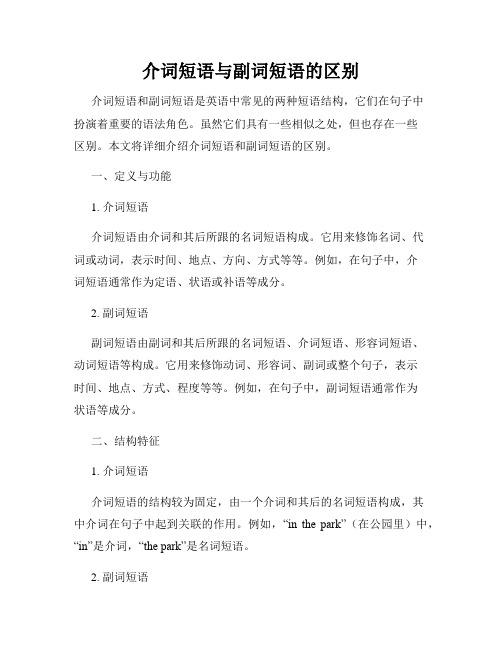
介词短语与副词短语的区别介词短语和副词短语是英语中常见的两种短语结构,它们在句子中扮演着重要的语法角色。
虽然它们具有一些相似之处,但也存在一些区别。
本文将详细介绍介词短语和副词短语的区别。
一、定义与功能1. 介词短语介词短语由介词和其后所跟的名词短语构成。
它用来修饰名词、代词或动词,表示时间、地点、方向、方式等等。
例如,在句子中,介词短语通常作为定语、状语或补语等成分。
2. 副词短语副词短语由副词和其后所跟的名词短语、介词短语、形容词短语、动词短语等构成。
它用来修饰动词、形容词、副词或整个句子,表示时间、地点、方式、程度等等。
例如,在句子中,副词短语通常作为状语等成分。
二、结构特征1. 介词短语介词短语的结构较为固定,由一个介词和其后的名词短语构成,其中介词在句子中起到关联的作用。
例如,“in the park”(在公园里)中,“in”是介词,“the park”是名词短语。
2. 副词短语副词短语的结构相对灵活,可以由副词和其他短语构成。
例如,“on the table”(在桌子上)中,“on”是副词,“the table”是名词短语。
三、用法区别1. 介词短语介词短语通常表示句子之间的关系,例如时间、地点、方向、方式等。
它常常和动词或名词连用,起到修饰或状语的作用。
例如,“They met at the restaurant”(他们在餐厅见面)中,“at the restaurant”表示地点。
2. 副词短语副词短语常常修饰动词、形容词或其他副词,表示时间、地点、方式、程度等。
它通常在句子中具有独立的修饰作用。
例如,“He ran quickly”(他跑得很快)中,“quickly”表示方式。
四、位置区别1. 介词短语介词短语通常直接位于其修饰的名词、代词或动词之后。
例如,“I went to the park”(我去了公园)中,“to the park”修饰动词“went”。
2. 副词短语副词短语通常可以位于句首、句中或句尾。
介词短语与副词短语的用法总结
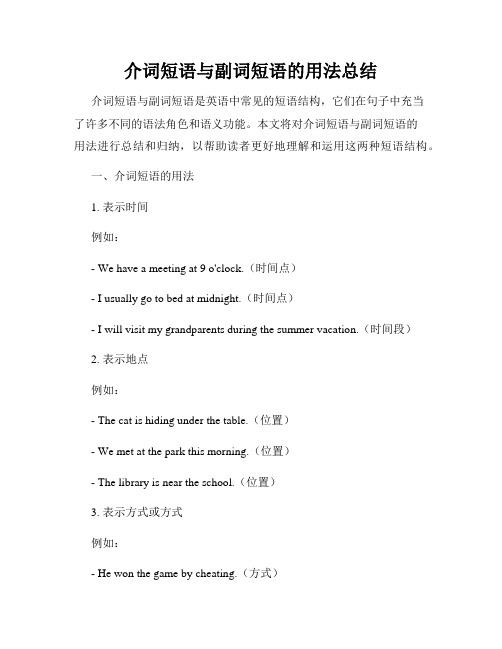
介词短语与副词短语的用法总结介词短语与副词短语是英语中常见的短语结构,它们在句子中充当了许多不同的语法角色和语义功能。
本文将对介词短语与副词短语的用法进行总结和归纳,以帮助读者更好地理解和运用这两种短语结构。
一、介词短语的用法1. 表示时间例如:- We have a meeting at 9 o'clock.(时间点)- I usually go to bed at midnight.(时间点)- I will visit my grandparents during the summer vacation.(时间段)2. 表示地点例如:- The cat is hiding under the table.(位置)- We met at the park this morning.(位置)- The library is near the school.(位置)3. 表示方式或方式例如:- He won the game by cheating.(方式)- She expressed her gratitude in a sincere way.(方式)4. 表示原因或目的例如:- I study hard for my future.(目的)- He is in hospital because of the accident.(原因)5. 表示对象或关系例如:- The book on the desk is mine.(属于关系)- The girl with glasses is my sister.(带有某种特征)6. 表示手段例如:- I cut the paper with scissors.(手段)- He communicates with others through social media.(手段)二、副词短语的用法1. 表示时间例如:- I will arrive soon.(时间)- She always wakes up early.(频率)- I have been waiting here for hours.(持续时间)2. 表示地点例如:- She lives nearby.(位置)- The restaurant is far away from here.(距离)3. 表示方式或方式例如:- He spoke loudly.(方式)- She dances gracefully.(方式)4. 表示程度或程度例如:- The weather is extremely hot today.(程度)- He is quite tired.(程度)5. 表示顺序或顺序例如:- First, we need to prepare the ingredients.(顺序)- She arrived last.(顺序)6. 表示原因或因果关系例如:- He didn't eat breakfast because he was late.(原因)- She fails the exam due to her laziness.(原因)7. 表示条件例如:- You can go to the party if you finish your homework.(条件)- I will help you as long as you need.(条件)总结:介词短语和副词短语在英语中有着广泛的应用,可以表示时间、地点、方式、原因、目的、关系、手段等不同语法和语义功能。
英语作文中最常见副词和介词短语

英语作文中最常见副词和介词短语副词是指在句子中表示行为或状态特征的词,用以修饰动词、形容词、其他副词或全句,表示时间、地点、程度、方式等概念。
介词短语,是介词和其它代词或名词或词组搭配形成的短语。
下面,店铺为大家分享英语作文中最常见副词和介词短语,希望对大家有所帮助!1. 表示次序和时间:first(ly), first of all, in the first place, first and foremost 首先second(ly), in the second place, next第二third(ly), then, in the third place第三finally, eventually, last of all, lastly, last but not the least最后meanwhile=in the meantime(同时), gradually =step by step(逐渐地), in the future, in the past, recently (最近), presently, currently(目前), for the time being (暂时)on the one hand (一方面)…on the other hand (另一方面)before , since, as, until, at the moment, whenever, , just as, when, while, immediately, instantly, (一……就), as soon as2. 表示程度和附加severely=seriously, heavily, strongly, possibly=perhaps=maybe=probably, likely, obviously (显而易见), apparently, seemingly (好像), as well, may as well (不妨), rarely, hardly, seldom, also, in addition, addit ionally, furthermore, m oreover, besides, what’s more, except for, except when, except that, apart from, as well as, as mentioned above (earlier)(如上所诉), including3. 表示相似或相反similarly, in the same way, as well as, again, both, neither, although, be that as it may (即使如此, 尽管那样), but, even though, however, in contrast, nevertheless, on the contrary (相反), on the other hand, yet, in spite of, despite, in spite of the fact that, while,whereas (但是, 然而), in other words, it seems that, it appears that, otherwise, notwithstanding4. 表示总结和结束to conclude, to sum up, all in all, in conclusion, in summary, in a word, in brief, on the whole, in general, by and large (总的来说, 大体而言), in the main (基本上)5. 表示结果, 目的`和推论in order to (that), so that, so …that, too …to, so as to, enough…to, due to, becaus e of, as a consequence, consequently, as a result, for this reason, hence ( 因此, 所以), therefore, thereby (由此; 因而), so, thus, inevitably, naturally, equally6. 表示强调或更差as is known to all, as we all know, it is generally/ publicly known / considered that…, not only…but also, it is …that (强调句型), above all, especially, in particular, particularly, in general, indeed, most importantly, the most important is …, surely, equally important is …, worse, making matters worse, as it stands(按照现在的情况), in fact, as a matter of fact, matter-of-factly, in reality (事实上),at heart (事实上,本质上)7. 表示例举for example, for instance, take …as an example, one such example is …, take …as an instance, a case in point , such as, like…, as sb. put it, as a proverb says, as a saying goes, just aslike, namely, to illustrate, among other things, typically, generally, particularly, especially8. 表示原因或方式because of, for, since, as, due to, thanks to, in terms of, in light of(=according to), by/in virtue of, in the way that…, by means of, via, thro ugh, by, with…, without …,according to, concerning, as regards, with regard to, in this regard/case, regardless of, asregards, in/with regards to/of, the reason why, in other words, in another way, say, owing to, as concerning, considering that, thanks to9. 表达自己的观点In my opinion, as far as I am concerned, personally speaking, I think, I deem, I believe, I am sure that, I have every reason to believe that, from my point of view, from my perspective。
英语作文常用连接词(层次,因果等等)
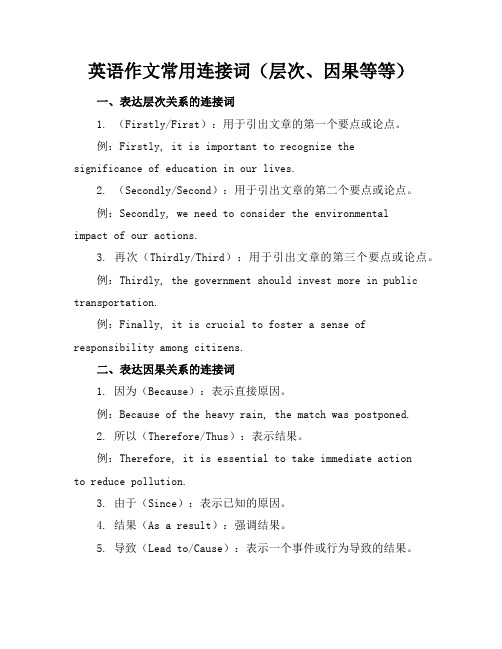
英语作文常用连接词(层次、因果等等)一、表达层次关系的连接词1. (Firstly/First):用于引出文章的第一个要点或论点。
例:Firstly, it is important to recognize thesignificance of education in our lives.2. (Secondly/Second):用于引出文章的第二个要点或论点。
例:Secondly, we need to consider the environmentalimpact of our actions.3. 再次(Thirdly/Third):用于引出文章的第三个要点或论点。
例:Thirdly, the government should invest more in public transportation.例:Finally, it is crucial to foster a sense of responsibility among citizens.二、表达因果关系的连接词1. 因为(Because):表示直接原因。
例:Because of the heavy rain, the match was postponed.2. 所以(Therefore/Thus):表示结果。
例:Therefore, it is essential to take immediate actionto reduce pollution.3. 由于(Since):表示已知的原因。
4. 结果(As a result):强调结果。
5. 导致(Lead to/Cause):表示一个事件或行为导致的结果。
例:The increase in population leads to a higher demandfor housing.通过熟练运用这些连接词,你的英语作文将更具逻辑性和条理性,使读者更容易理解和跟随你的思路。
英语中的副词用法与常见副词短语
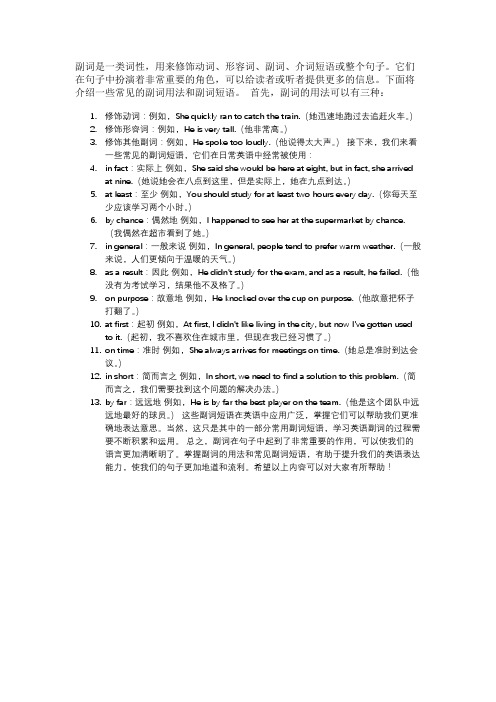
副词是一类词性,用来修饰动词、形容词、副词、介词短语或整个句子。
它们在句子中扮演着非常重要的角色,可以给读者或听者提供更多的信息。
下面将介绍一些常见的副词用法和副词短语。
首先,副词的用法可以有三种:1.修饰动词:例如,She quickly ran to catch the train.(她迅速地跑过去追赶火车。
)2.修饰形容词:例如,He is very tall.(他非常高。
)3.修饰其他副词:例如,He spoke too loudly.(他说得太大声。
)接下来,我们来看一些常见的副词短语,它们在日常英语中经常被使用:4.in fact:实际上例如,She said she would be here at eight, but in fact, she arrivedat nine.(她说她会在八点到这里,但是实际上,她在九点到达。
)5.at least:至少例如,You should study for at least two hours every day.(你每天至少应该学习两个小时。
)6.by chance:偶然地例如,I happened to see her at the supermarket by chance.(我偶然在超市看到了她。
)7.in general:一般来说例如,In general, people tend to prefer warm weather.(一般来说,人们更倾向于温暖的天气。
)8.as a result:因此例如,He didn't study for the exam, and as a result, he failed.(他没有为考试学习,结果他不及格了。
)9.on purpose:故意地例如,He knocked over the cup on purpose.(他故意把杯子打翻了。
)10.at first:起初例如,At first, I didn't like living in the city, but now I've gotten usedto it.(起初,我不喜欢住在城市里,但现在我已经习惯了。
英文写作中常用的高级副词
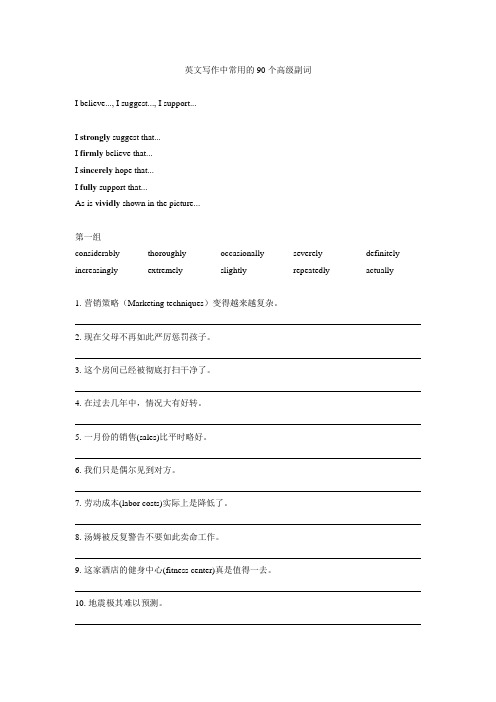
英文写作中常用的90个高级副词I believe..., I suggest..., I support...I strongly suggest that...I firmly believe that...I sincerely hope that...I fully support that...As is vividly shown in the picture...第一组considerably increasingly thoroughlyextremelyoccasionallyslightlyseverelyrepeatedlydefinitelyactually1.营销策略(Marketing techniques)变得越来越复杂。
2.现在父母不再如此严厉惩罚孩子。
3.这个房间已经被彻底打扫干净了。
4.在过去几年中,情况大有好转。
5.一月份的销售(sales)比平时略好。
6.我们只是偶尔见到对方。
7.劳动成本(labor costs)实际上是降低了。
8.汤姆被反复警告不要如此卖命工作。
9.这家酒店的健身中心(fitness center)真是值得一去。
10.地震极其难以预测。
第二组unexpectedly gradually entirelysurprisinglyrarelyfrequentlyeffectivelyeventuallysharplyabsolutely1.考试简单得惊人。
2.在过去的几个月里价格急剧上升。
3.情况已逐渐改善。
4.儿童得学会有效地交流。
5.我们的情况完全不同。
6.他患病而终于不治。
7.谁也想不到他父亲去世了。
8.公共汽车频繁地从城市驶往机场。
9.我很少在饭店吃饭。
10.这是绝对不可能的。
第三组accordingly merely totallynecessarysimilarlyefficientlyincrediblysurelynaturallyroughly1.我们这样才能更加有效地学习?2.我已经把情况告诉你了,你得采取相应的行动。
英语小作文常用副词大全

英语小作文常用副词大全Sure, here's a comprehensive list of commonly used adverbs in English writing:1. Actually: Actually, I quite like the idea.2. Additionally: Additionally, we can consider other options.3. Alternatively: Alternatively, we could try adifferent approach.4. Basically: Basically, it's a simple concept to grasp.5. Certainly: Certainly, I will attend the meeting.6. Clearly: Clearly, there are some issues we need to address.7. Consequently: Consequently, we had to revise our8. Definitely: Definitely, we should proceed with caution.9. Evidently: Evidently, there has been a misunderstanding.10. Eventually: Eventually, we reached a consensus.11. Exactly: Exactly, that's what I was thinking.12. Fortunately: Fortunately, the problem was resolved quickly.13. Generally: Generally, people tend to agree on this point.14. Hopefully: Hopefully, things will improve in the future.15. However: However, there are some exceptions to the16. Indeed: Indeed, it is a remarkable achievement.17. Interestingly: Interestingly, the results varied significantly.18. Likewise: Likewise, we can apply the same principle here.19. Moreover: Moreover, there are other factors to consider.20. Naturally: Naturally, there will be some resistance to change.21. Obviously: Obviously, this situation requires immediate attention.22. Particularly: Particularly, I enjoyed the last section of the book.23. Possibly: Possibly, we could explore alternative solutions.24. Precisely: Precisely, that's the point I was trying to make.25. Presumably: Presumably, they will arrive shortly.26. Primarily: Primarily, the focus should be on customer satisfaction.27. Probably: Probably, it's best to wait for further instructions.28. Promptly: Promptly, he responded to my email.29. Quite: Quite frankly, I'm not sure about that.30. Really: Really, I can't thank you enough for your help.31. Recently: Recently, there have been some changes tothe policy.32. Similarly: Similarly, we need to consider all options.33. Simply: Simply put, we need more time to completethe project.34. Sincerely: Sincerely, I apologize for any inconvenience caused.35. Subsequently: Subsequently, we witnessed a declinein sales.36. Suddenly: Suddenly, there was a loud noise from outside.37. Surely: Surely, there must be a better solution.38. Therefore: Therefore, we must take immediate action.39. Ultimately: Ultimately, the decision lies with theboard of directors.40. Usually: Usually, meetings are held on Monday mornings.These adverbs can add depth and clarity to your writing, helping to convey your thoughts and ideas more effectively.。
表示时间的介词短语与副词

例如,“在昨天下午,我们去了公园。”
02 03
介词短语位于句中
介词短语可以放在句子的主语和谓语之间,或者放在谓语之后,用来描 述动作发生的时间。例如,“我们昨天下午去了公园。”或“我们去了 公园,在昨天下午。”
介词短语位于句尾
介词短语也可以放在句子的末尾,用来补充说明动作发生的时间。例如 ,“我们去了公园,时间是昨天下午。”
Байду номын сангаас
03
时间介词短语与副词 的区别
时间介词短语主要用于表示具体的时 间点或时间段,而时间副词则更侧重 于描述动作发生的时间状态。
拓展延伸相关知识点
与时间相关的其他介词
除了表示时间的介词短语外,还有一些与时间相关的其他介词,如“自从”、“当……时”、“趁……时候 ”等,用于表示时间的起点、终点或特定时刻。
02 03
最后
finally,eventually,ultimately
05
04
同时
simultaneously,concurrently,at the same time
03
介词短语与副词在句子中位置
介词短语在句子中位置
01
介词短语位于句首
在句子开头使用介词短语,可以起到引导句子、突出时间信息的作用。
in
表示较长的时间段,如in the morning(在早上 ),in the afternoon(在下午)
3
on
表示特定的某一天或某一天的上午、下午,如on Monday(在周一),on the morning of August 8th(在8月8日的上午)
表示时间点与时间段
时间点
常用介词at加上具体的时间,如at 7 o'clock(在7点钟)
介词、副词和动词短语

一、介词的意义和用途我们经常在名词或名词短语、代词或动名词前面用介词表示人、物、事件等之间的关系介词+ 名词:I gave the boo k to Cha rlie介词+ 代词: Igave itto him介词+ 动名词: Charlie devotes his tim e to rea ding有的介词所表示的关系是;空间: We ran acr oss thefield时间: The pl ane land ed at 425 preci sely原因: Travelis cheap for usbecauseof the s trengthof the d ollar方法: Y ou un lock the door by turning the key to theright介词始终带有宾语。
即使介词与宾语分开时,如在问句中或者关系从句中,这种关系仍必定存在。
Who(m) were yo u talkin g to jus t now on the pho ne? (= T o whom )The ch air I wa s sittin g on was very sh aky (= T he chair on whic h...)二、介词后的代词英语名词没有格的变化,因此它们用作动词或介词的宾语时,其形式不变;There s a chair behind/by/in fr ont of/n ear thedoor但介词后的动词必须用其宾格形式:T he car s topped b ehind/in front o f/near m e/him/he r/us/the mBetwe en you a nd me, t here s n o truthin the r eport(不可说'betw een youand I).三、一个词何时为介词、副词或连词介词“支配”着宾语,所以它总是与名词、名词短语、代词或动名词有关;而副词不;“支配”宾语,因此它与动词的关系较为密切。
副词和介词

第9讲:副词和介词副词2016/7/30 介词●副词✐形式简单形式:bien, mal, hier, moins, tôt, maintenant,loin以-ment结尾:普通词,词尾为-i, é, u, 词尾为-ant, -ent, 词尾,特殊形式复合形式:de bonne heure, tout à fait形容词做副词✐功能修饰动词修饰形容词修饰另一副词修饰介词修饰整个句子 (évidemment, peut-être, sans doute, bien sûr, certainement, probablement, heureusement…)连接两个句子(puis, ensuite, enfin, d’ailleurs, en effet, cependant, pourtant, c’est pourquoi, par conséquent, en revanche…)做表语(ensemble, bien, loin, près, mal, debout…)做名词补语 hier, ici✐位置修饰整个句子:句首,句中,句末修饰动词:简单时态复合时态:数量,方式,程度副词;时间,地点,普通不定式:数量副词(beaucoup, un peu, trop, assez, autant…)(souvent, toujours, bien, mal, déjà) ;时间,地点,普通修饰形容词:形容词前✧peut-être, sans doute, encore :位于句首倒装,平述,动词后✧ainsi, aussi✐比较级和最高级阳性单数✧最高级+possible✐plutôt+比较对象+que名词+形容词faireqqchplôtotque de faire qqch✐bien副词:不变词形,verbe+bien, bien+adjectif, bien de +冠词+名词,加强肯定一个语气形容词:不变词形,诚实的,符合道德规范的,美观,身体状况良好,合适的名词:单数(益处,称赞的话),复数(财产)感叹词:讚赏,疑问,惊喜转入另一主题✐tout泛指代词:词形tout, tout le monde, tous, toutes用法:tout (泛指一切,罗列事物的全部,形容词阳性单数,动词第三人称单数)tout le monde形容词阳性单数,动词第三人称单数tous前面提到过的名词;强调主语,直宾;单独使用✧简单时态:简单时态放在变位动词后;若强调直宾,重复les;不定式中;放在不定式后面复合时态泛指形容词:词形tout, tous, toute, toutes用法:tout + 限定词+名词,表整体性tout un/une+名词,用在口语中tous les 数词+时间名词tout/toute+un,une,le la+时间段tous/toutes+(les)+数量形容词tout+指示代词tout ce +定语从句tout(e) +单数名词固定表达:à tout âge, à tout prix, à toute vitesse, à tout propos, de tout cœur, avoir tout intérêtà toutes jambes, en toutes lettres, à tous égards, toutes voiles dehors泛指副词:词形 tout, toute (honteuse), toutes(honteuses)引导让步状语,tout+nom/adj +que用于介词和副词前短语:tout à coup, tout d’un coup, tout de suite●介词介词后接名词,代词,不定式,在句中做状语,补语,宾语✐à状语:时间地点方式目的价格数量度量引导名词补语:用途特征构造方式所属地点时间近似值引导间接宾语引导形容词补语引导词补语avoir trop à faire引导动词不定式做状语,表程度✐de引导间接宾语引导形容词补语引导被动语态施动者引导名词补语:所属材料种类内容数量方向来源原因引导状语:时间的起始时间的延续起点(depuis)方式,方法原因计量,差异方向材料引导表语:一致归属性质✐en表示所处的地点,要去的地点表示时间表示完成一个动作需要的时间(含有方法的概念)表示领域表示所处的状态表示服饰表示材料表示方式手段表示变化表示资格✐dans表示具体所在的场所表示状态,境遇表示时间:在某段时期,在多久以后表示方式方法:按照(dans les régles)表示约数✐par引出施动者补语引出地点补语:经过,通过遍及位置(par terre, par ici)引出时间补语:表示在某种天气下引出方式补语引出原因补语(动机)表平均分配分为表动作的开始,结束✐pour表示去向表示目的表示对象表示时间的延续和完成(patir, venir, aller)原因(内容更具体)表示等价交换比例赞同让步紧密连接的动作✐sur位置,有接触点朝向比例依据✐Entre et parmi✐Vers et envers✐ A bord et au bord de✐Dès et depuis。
高中英语作文常用副词
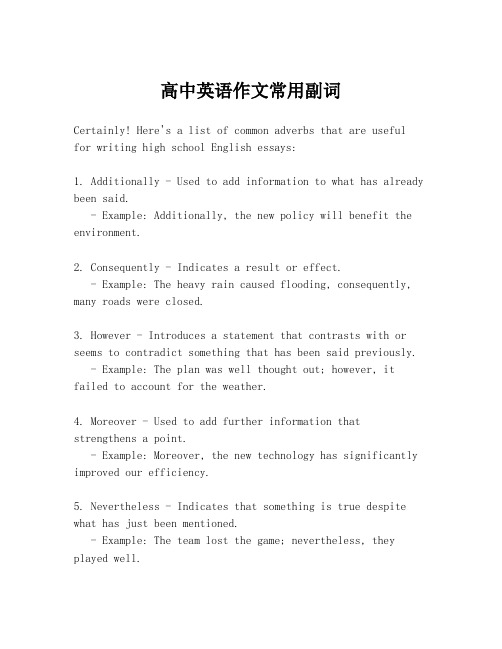
高中英语作文常用副词Certainly! Here's a list of common adverbs that are usefulfor writing high school English essays:1. Additionally - Used to add information to what has already been said.- Example: Additionally, the new policy will benefit the environment.2. Consequently - Indicates a result or effect.- Example: The heavy rain caused flooding, consequently, many roads were closed.3. However - Introduces a statement that contrasts with or seems to contradict something that has been said previously. - Example: The plan was well thought out; however, it failed to account for the weather.4. Moreover - Used to add further information that strengthens a point.- Example: Moreover, the new technology has significantly improved our efficiency.5. Nevertheless - Indicates that something is true despite what has just been mentioned.- Example: The team lost the game; nevertheless, they played well.6. Otherwise - Used to indicate what the alternative would be if something else does not happen.- Example: You must complete the assignment by Friday; otherwise, you will receive a zero.7. Similarly - Used to compare two things that are alike in some way.- Example: Similarly, both books deal with themes of loss and recovery.8. Subsequently - Indicates that something happened after something else.- Example: The company launched a new product, and subsequently, sales increased.9. Therefore - Used to show the result or conclusion of something.- Example: The evidence was compelling; therefore, the defendant was found guilty.10. Ultimately - Indicates the final outcome or result.- Example: Despite the challenges, the project was ultimately successful.11. Conversely - Used to show that something is the opposite of what has just been stated.- Example: Some people prefer to travel by train, whereas others, conversely, prefer flying.12. Likewise - Used to show that the same thing is true for another person or thing.- Example: She enjoys reading; likewise, her brother loves books.13. Consequently - Used to indicate the result of something. - Example: The factory was shut down, and consequently, many workers lost their jobs.14. Consequently - Used to indicate the result of something. - Example: The factory was shut down, and consequently, many workers lost their jobs.15. Evidently - Used to indicate that something is clear or obvious.- Example: Evidently, the team has been working hard to prepare for the tournament.16. Hence - Used to show the reason for something.- Example: The road was closed due to flooding, hence the traffic delays.17. Particularly - Used to emphasize a specific aspect.- Example: The author is particularly interested in the impact of technology on society.18. Presumably - Used to express an opinion based on what is known or believed.- Example: Presumably, the meeting will be rescheduledfor a later date.19. Surprisingly - Used to express that something is unexpected.- Example: Surprisingly, the new policy was met with widespread approval.20. Typically - Used to describe what usually happens or is the case.- Example: Typically, the exam will cover material from the entire semester.Using these adverbs correctly can help you write more sophisticated and nuanced essays. Remember to use them in the right context to enhance the clarity and effectiveness of your writing.。
初中英语短语与句型(必备)

初中英语短语与句型(必备)下面是语文迷为大家整理的常用的英语短语集锦,希望对大家写英语作文有所帮助。
一、动词+介词1.look at …看…, look like… 看上去像… …, look after…照料…2.listen to …听… … 3.welcome to …欢迎到… …4.say hello to…向… …问好5.speak to …对… …说话此类短语相当于及物动词,其后必须带宾语,但宾语无论是名词还是代词,都要放在介词之后。
二、动词+副词“动词+副词”所构成的短语义分为两类: A.动词(vt.)+副词1.put on 穿上 2.take off脱下 3.write down记下此类短语可以带宾语,宾语若是名词,放在副词前后皆可;宾语若是人称代词,只能放在副词前面。
B.动词(vi)+副词。
e on赶快 2.get up起床 3.go home回家e in进来 5.sit down坐下 6.stand up起立此类短语属于不及物动词,不可以带宾语。
三、其它类动词词组 1.close the door 2.1ook the same 3.go to work/class 4.be ill 5.have a look/seat 6.have supper 7.1ook young 8.go shopping 9.watch TV/games 10. play games[介词短语聚焦] “介词+名词/代词”所构成的短语称为介词短语。
现将Unitsl-16常用的介词短语按用法进行归类。
1.in+语言/颜色/衣帽等,表示使用某种语言或穿着… …。
3.in the morning/ afternoon/ evening/ 表示“在上午/下午/傍晚”等一段时间。
4.in the desk/ pencil-box/bedroom 等表示“在书桌/铅笔盒/卧室里”。
5.in the tree表示“在树上 (非树本身所有) ”;on the tree 表示“在树上(为树本身所有) ”。
常用介词及副词的搭配用法归纳分析解析

常用介词及副词的搭配用法归纳(-)aboutabout既可以用作介词也可以用作副词,它常和下列名词,动词,形容词搭配使用。
名词+abouttalk about 关于???谈话;information about/on 关于???知识,消息动词+aboutthink about sth. 考虑某事look about 环顾;考虑bring about 带来,造成,引起leave about 乱放come about 发生go about 四处走动get about 走动,传开,着手干set about 开始,着手hang about 逗留,徘徊put about 传播谣言turn about 回首,转身,轮流tell sb.about sth. 告诉某人某事grief about sth. 对…伤心confuse sb.about sth 使某人对某事感到混乱bother sb.about sth 为某事打扰某人gossip about sb.or sth.谈论、闲聊某人或某事形容词+abouthopeful about/of 希望,期待particular about 对…讲究,特别enthusiastic about 对…热心crazy about ab./sth. 对…欣喜sure about/of 对..确定知道,对…有把握anxious about 对…担忧,焦虑anxious for 渴望careful about/of 注意,保护,保重careful with 对…注意,照顾careless about 对…不留心feel nervous about/at sth. 对…感到不安doubtful about/of 对…感到好奇optimistic about 对…感到乐观happy about/at sth. 因某事而感到高兴(二)acrossacross 既可以用作介词也可以用作副词,它常与下列动词搭配使用。
英语作文词汇
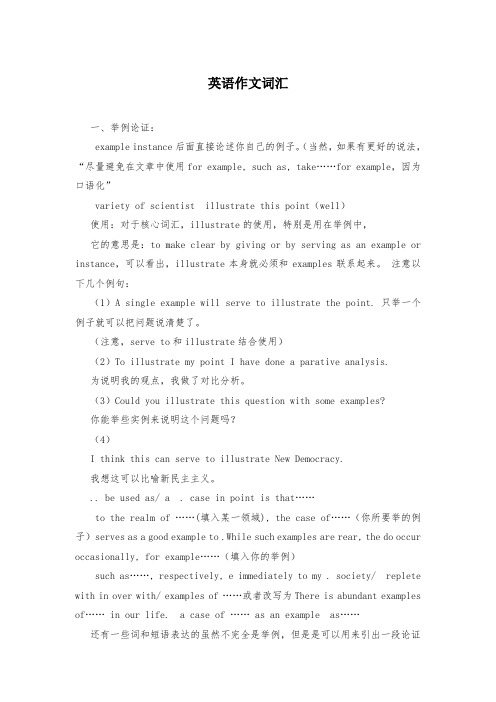
英语作文词汇一、举例论证:example instance后面直接论述你自己的例子。
(当然,如果有更好的说法,“尽量避免在文章中使用for example, such as, take……for example,因为口语化”variety of scientist illustrate this point(well)使用:对于核心词汇,illustrate的使用,特别是用在举例中,它的意思是:to make clear by giving or by serving as an example or instance,可以看出,illustrate本身就必须和examples联系起来。
注意以下几个例句:(1)A single example will serve to illustrate the point. 只举一个例子就可以把问题说清楚了。
(注意,serve to和illustrate结合使用)(2)To illustrate my point I have done a parative analysis.为说明我的观点,我做了对比分析。
(3)Could you illustrate this question with some examples?你能举些实例来说明这个问题吗?(4)I think this can serve to illustrate New Democracy.我想这可以比喻新民主主义。
.. be used as/ a . case in point is that……to the realm of ……(填入某一领域), the case of……(你所要举的例子)serves as a good example to .While such examples are rear, the do occur occasionally, for example……(填入你的举例)such as……, respectively, e immediately to my . society/ replete with in over with/ examples of ……或者改写为There is abundant examples of…… in our life. a case of …… as an example as……还有一些词和短语表达的虽然不完全是举例,但是是可以用来引出一段论证或例子的,也罗列在下面:,adv.即, 也就是(用于具体举例):例如:(1)Only one person can do the job, namely you.只有一个人能做这项工作,那就是你。
英语作文常用介词短语大全

英语作文常用介词短语大全作文常用的介词有那下?下面为大家带来了介词短语,请看:at 短语be angry at sth.对某事生气arrive at到达……(小地方)knock at/on敲……at last最后,终于laugh at嘲笑at the moment现在,此时point at/to指向at times不时on 短语agree on(通过协商)达成共识call on拜访,看望come on快点儿;加油on display在展出hang on稍等,别挂断on holiday度假,休假play a joke on和……开玩笑,戏弄……keep on继续live on以……为食,靠……生活put on穿上;戴上turn on打开,旋开(收音机、电灯、煤气等)work on从事于,致力于to 短语agree to同意,答应,接受(计划、建议、条件、安排等) compare...to...把……与……作比较from...to...从……到……get to 到达do harm to对……有害处lead to通往;导致pay attention to注意to one’surprise使某人吃惊的是take...to...把……带到/给……write to...写信给……in 短语arrive in到达……(大地方)in danger在危险中drop in顺便拜访hand in交上,上交join in参加in a moment马上,立即take part in参加take pride in以……为荣in surprise吃惊地,惊讶地of 短语be afraid of害怕take care of照顾;处理make fun of嘲笑……instead of代替;而不是learn of听说……speak of谈到,提起think of考虑;想出;认为about 短语care about担心;关心think about考虑for 短语call for需要,要求;提倡,号召care for关怀,照顾except for除了……之外fight for为……而战leave for...前往……,去……look for寻找for a moment一会儿pay for sth.为……付款send for派人去请away 短语give away分发;赠送put away收好,放好take away拿走,带走throw away扔掉out 短语break out(火灾、战争等)突然发生,爆发out of breath上气不接下气find out发现give out分发go out出去make out理解,明白point out指出run out用完sell out卖完send out发出set out动身,出发;开始,着手take out取出,拿出turn out证明是,结果是work out算出;解决with 短语agree with sb.同意某人be angry with sb.生某人的气keep up with赶上catch up with赶上,追上come up with提出,想出be covered with被……覆盖deal with处理;对待be filled with用……充满make friends with sb.与某人交朋友get along/on (well) with sb.与某人相处(融洽) help sb. with sth.帮助某人做某事over 短语come over顺便来访fall over跌倒go over复习,温习;检查look over检查think over仔细考虑turn over把……翻过来;移交,转交down 短语break down损坏;中断cut down砍倒;削减,压缩get down下来go down下落,下降pull down拆毁put down放下;写下set down放下;记下shut down把……关上,关闭take down写下;记下turn down关小,调低write down写下,记from 短语across from... 在……的对面break away from...脱离……be different from.. 与……不同hear from.. 收到……的来信learn from ... 向……学习tell...from... 区分……辨别……up 短语bring up养育,教育call up打电话;想起cheer up使……振奋fill up填满,装满fix up修理:安装go up上升,上涨grow up长大(成人)hurry up赶快,赶紧look up查阅,查找;向上看make up one’s mind决定,决心pick up (sb.)拾起;搭载/接载(某人) put up举起,挂起:张贴:搭建save up存钱,积蓄set up创立,建立show up出席,露面sit up坐起来stay up不睡,熬夜shut up住嘴speak up大声说think up想出tidy up整理turn up开大,调大(音量)off 短语fall off从……跌落get off下车give off发出(光、热、气味等) hurry off匆匆离去put off推迟see sb. off为某人送行set off出发,启程show off显示;夸耀take off脱下turn off关掉(收音机、电灯、煤气等) after 短语look after照看,照顾name after以……的名字命名run after追赶;追求重叠式短语again and again再三地,反复地arm in arm臂挽着臂bit by bit一点一点地,逐渐地day after day日复一日from door to door挨家挨户face to face面对面here and there到处,处处from house to house挨家挨户less and less越来越少all day and all night整日整夜neck and neck并驾齐驱,不分上下one by one一个接一个地side by side肩并肩;一个接一个step by step逐步。
英语作文常用的短语

英语作文常用的短语1. At the beginning of - 用于引出文章的开头。
- At the beginning of the story, the protagonist faced a significant challenge.2. In addition to - 用于添加信息。
- In addition to being a skilled musician, she was also a talented painter.3. First and foremost - 用于强调最重要的点。
- First and foremost, education is the key to a better future.4. Furthermore - 用于进一步阐述。
- Furthermore, the research indicates that regular exercise improves mental health.5. In conclusion - 用于总结文章。
- In conclusion, the benefits of a healthy lifestyle are undeniable.6. For instance - 用于举例说明。
- For instance, the use of renewable energy sources can significantly reduce carbon emissions.7. On the other hand - 用于对比不同观点或事实。
- On the other hand, some argue that technology has a negative impact on social interaction.8. As a result - 用于说明结果。
- As a result of the new policy, the company saw an increase in employee satisfaction.9. Consequently - 用于表示因果关系。
- 1、下载文档前请自行甄别文档内容的完整性,平台不提供额外的编辑、内容补充、找答案等附加服务。
- 2、"仅部分预览"的文档,不可在线预览部分如存在完整性等问题,可反馈申请退款(可完整预览的文档不适用该条件!)。
- 3、如文档侵犯您的权益,请联系客服反馈,我们会尽快为您处理(人工客服工作时间:9:00-18:30)。
before , since, as, until, at the moment, whenever, , just as, when, while, immediately, instantly, (一……就), as soon as
7. 表示例举
for example, for instance, take …as an example, one such example is …, take …as an instance, a case in point , such as, like…, as sb. put it, as a proverb says, as a saying goes, just as\like, namely, to illustrate, among other things, typically, generally, particularly, especially
5. 表示结果, 目的和推论
in order to (that), so that, so …that, too …to, so as to, enough…to, due to, because of, as a consequence, consequently, as a result, for this reason, hence ( 因此, 所以), therefore, thereby (由此; 因而), so, thus, inevitably, naturally, equally
4.表示总结和结束
to conclude, to sum up, all in all, in conclusion, in summary, in a word, in brief, on the whole, in general, by and large (总的来说, 大体而言), in the main (基本上)
9. 表达自己的观点
In my opinion, as far as I am concerned, personally speaking, I think, I deem, I believe, I am sure that, I have every reason to believe that,ቤተ መጻሕፍቲ ባይዱfrom my point of view, from my perspective
3.表示相似或相反
similarly, in the same way, as well as, again, both, neither, although, be that as it may (即使如此, 尽管那样), but, even though, however, in contrast, nevertheless, on the contrary (相反), on the other hand, yet, in spite of, despite, in spite of the fact that, while, whereas (但是, 然而), in other words, it seems that, it appears that, otherwise, notwithstanding
2.表示程度和附加
severely=seriously, heavily, strongly, possibly=perhaps=maybe=probably, likely, obviously (显而易见), apparently, seemingly (好像), as well, may as well (不妨), rarely, hardly, seldom, also, in addition, additionally, furthermore, moreover, besides, what’s more, except for, except when, except that, apart from, as well as, as mentioned above (earlier)(如上所诉), including
finally, eventually, last of all, lastly, last but not the least最后
meanwhile=in the meantime(同时), gradually =step by step(逐渐地), in the future, in the past, recently(最近), presently, currently(目前), for the time being (暂时)
8.表示原因或方式
because of, for, since, as, due to, thanks to, in terms of, in light of(=according to), by/in virtue of, in the way that…, by means of, via, through, by, with…, without …,according to, concerning, as regards, with regard to, in this regard/case, regardless of, as regards, in/with regards to/of, the reason why, in other words, in another way, say, owing to, as concerning, considering that, thanks to
1.表示次序和时间:
first(ly), first of all, in the first place, first and foremost 首先
second(ly), in the second place, next第二
third(ly), then, in the third place第三
6.表示强调或更差
as is known to all, as we all know, it is generally/ publicly known / considered that…, not only…but also, it is …that (强调句型), above all, especially, in particular, particularly, in general, indeed, most importantly, the most important is …, surely, equally important is …, worse, making matters worse, as it stands(按照现在的情况), in fact, as a matter of fact, matter-of-factly, in reality (事实上),at heart (事实上,本质上)
